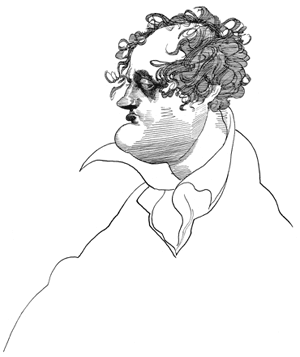“The great object of life,” Byron wrote, “is sensation—to feel that we exist, even though in pain. It is this ‘craving void’ which drives us to gaming—to battle, to travel—to intemperate, but keenly felt, pursuits of any description, whose principal attraction is to the agitation inseparable from their accomplishment.” And Stendhal confirmed him when he said that an age of revolutions and wars gives a “continual thirst for strong emotions. When they subside for a while, boredom follows until they rise again.” We are enough in the same situation today to make an interest in Byron revive.
The parallels are striking whether they are exact or transformed: when, say, the Byronic sense of doom becomes the contemporary concern with sickness; when atheism becomes nihilism; when private or public liberation turns into violence; when the Byronic cynicism turns into our fascination with the aberrant and dubious; when Byron’s sexual opportunism is matched by our sentimentality or our permissiveness. Such rebellions need a showman—and Byron certainly was that—who collects all contradictions with a genius which is half journalistic, half conversational. Hazlitt thought it intolerable that a nobleman should be a poet, on general republican grounds; but it was awkward for Hazlitt that Byron had caught some of his own Napoleonic fever and was an apostle of liberty.
It is also suspected that part of the fame of Byron springs from the fact that he provided the prudent middle classes with a gaudy devil and aristocrat whom they secretly envied. Taste was not their strong point, nor was it his. It adds to these ironies that Byron was brought up in pinched circumstances and as a Scottish Calvinist, and became a peer by chance. His masks of snobbery and pride were assumed because he was never at ease in aristocratic society; although a scoffer, he was in naïve awe of genuinely religious minds. A final revolutionary sign is in his writing; it is impudently talkative in style, careless of prepositions, to the point of brilliant anger, good-natured anticlimax.
Some interest in the echoes of Byron’s age in our own may have prompted Mr. Steffan’s new and scholarly edition of Byron’s Cain, said to be the first correct edition since 1821. It is one of Byron’s hurried pieces of work, with the usual autobiographical overtones, and very wooden. Spontaneity easily becomes cliché. The writing has been properly described as tuneless. A final despair in keeping wickedness going has entered the mind of the poet who was in the doldrums of his long and only domestic attachment to the Guiccioli: even the gods are seen to be unhappy, as Mr. Marchand notes. But—the world’s first murder! What a subject for today! It draws upon Byron’s early Calvinist drilling in the Old Testament, but is not a dramatization of the Bible story so much as a speculation about predestination, fate, free will, and the problem of evil. Lucifer is one of those
Souls who dare look the Omnipotent tyrant in
His everlasting face and tell him that
His evil is not good.
(Lines that parody Byron’s calculated slapdash manner of versifying—odd in a poet who revered Pope; Mr. Steffan includes a patient essay on Byron’s prosody.)
One or two high-minded theater companies have strenously tried to stage this pleasureless piece. James Joyce had the better idea of making an opera out of it—and with an Irish singer, too—and perhaps by hacking it to pieces the thing could have been done. Byron’s contemporaries, as Mr. Steffan sets out in detail, were of course argumentative about the theology, but the fundamental formal and practical objection has always been to the scene in which Lucifer takes Cain on a Time-Machine tour through pre-history in the pursuit of absolute knowledge: it is unplayable. (The episode is just conceivable on television but it is difficult to portray an “êetre” freewheeling in the “néant.”) Another objection is that there is no conflict because Byron has funked introducing the Almighty. The only real conflict is buried in the harassed minds of Cain and of Lucifer himself.
Yet Byron certainly had a sound dramatic instinct. The critics showed they knew nothing of the theater when they objected (in the long confrontation between Lucifer and Cain) that Lucifer met a question with another question. This taunting of the student by the professor could play very well; and the psychological preparation for the murder is admirable. Also Byron had a sounder insight into psychotic behavior than his theological critics had. He wrote:
Cain is a proud man: if Lucifer promised him kingdoms etc. it would elate him: the object of the Demon is to depress him still further in his own estimation than he was before, by showing him infinite things and his own abasement, till he falls into the frame of mind that leads to the Catastrophe, from mere internal irritation, not premeditation, or envy of Abel (which would have made him contemptible), but from the rage and fury against the inadequacy of his state to his conceptions, and which discharges itself rather against Life, and the Author of Life, than the mere living.
Byron naturally makes the Byronic point that Cain’s marriage is incestuous. He loves darkening his own secret and one wonders still whether he didn’t play with that idea as he played with the idea of murder.
Advertisement
Still, modern biographers like Mr. Grebanier and Mr. Marchand are pretty well convinced of the incest with Augusta, as they are of his homosexuality. The evidence is formidable. The chief difficulty lies in the amount of gossip that Byron provoked. To Lady Blessington he said,
People take for gospel all I say and go away continually with a false impression…. Now, if I know myself I should say that I had no character at all…. But joking apart, what I think of myself is, that I am so changeable, being everything by turns and nothing long—I am such a strange mélange of good and evil, that it would be difficult to describe me. But there are two sentiments to which I am constant—a strong love of liberty, and a detestation of cant, and neither is calculated to gain me a friend.
In fact he had a number of devoted friends. They were mostly men.
There is a baffling mixture of affectation and candor—the candor is most spirited in his brilliant letters when he wrote recklessly to entertain. Mr. Grebanier is a whole-hogger on the question of Byron’s “sexual confusion.” He documents Byron’s love affairs with boys and he is absolutely certain of the incest, for on top of everything else he has read Medora Leigh’s tragic autobiography and quotes the heart-rending letter she wrote (when she was living in misery) to Augusta, her mother. She was certain she was Byron’s child. (The young people of the Regency aristocracy were indifferent to the miscellaneous children they begot.) On the homosexuality, Mr. Grebanier reprints the whole of the clever pornographic poem Don Leon by George Colman, who knew Byron well; and, partly on this, conjectures that the decisive reason for Byron’s separation from Lady Byron was not the incest story but an “unnatural” act.
This is a classic accusation in the Courts to the extent of being a popular smut myth; and Mr. Marchand, in his more cautious portrait, is dubious, simply because it is a too probable item of gossip. We now think that in sexual love nothing is “unnatural”; but how do we know what Lady Byron thought “unnatural”? She was a very pious—and very vindictive—woman, and she hadn’t read Lady Chatterley’s Lover or Havelock Ellis.
There is certainly enough sexual disorder in Byron’s life, but one needn’t trace his dramatic sense of being doomed by crimes he couldn’t openly mention exclusively to this source. The Calvinist teachings of his nurse and her corruption of him sexually must have been a powerful influence; for, after her sexual intimacies with him, the nurse surely filled him with the utmost religious terror, in order to make the boy keep his mouth shut. And there are other influences: the quite frightful tale of the dissipations of his forebears, the appalling violence and insults of his mother, the curse of the club foot. Byron hated women and yet was feminine enough to love the ease of their company. He was less a rake than an opportunist. The love of comfort and procrastination are paradoxical in the man who believed in mobility. Some years ago Peter Quennell was more perceptive in his portrait than the brisk Mr. Grebanier:
As in many a bisexual temperament, that emotion [the homosexual] was curiously narcissistic. We love only ourselves, declares Paul Valèry; in love it is the self that we desire, the self that we long to encounter; and of Byron it is certainly true that a passionate preoccupation with himself—a personage both loved and abominated—ran deeper than any passion of a normal kind.
Mr. Marchand follows his well-known three-volume Life with an attempt at a more succinct portrait, which is very well done, though inevitably it turns into a short biography. In this book he relies mostly on Byron’s self-portrayal in verse—the rapid, idealizing therapy that took the sting out of his pains. The astonishing thing is the speed of the treatment and the facility with which he managed his double nature. His rejections cut him deeply; his successes soon left him cold: he could remember every instant of his rejected love for Mary Chaworth, perhaps because nostalgia was his strongest feeling: it is the dominant emotion of dying cultures, or cultures at the crossroads.
Advertisement
The chapter on the last weeks at Missalonghi are excellent for here Byron does complete himself. The worldly companion of the letters, full of good humor, loves being a military leader and will free the Greeks though he sees through their corruption, their greed, and their military incapacity. He is able to keep calm and to be brave when they are threatening or in confusion. He has a presence and a determination that arrests them. But once more the Narcissus of thirty-six falls in love with a boy who rejects him, in part because Byron was too candid, as usual, about himself. Balding, fat, flabby, and with loose teeth—he does not spare himself:
Thus much and more, and yet thou lov’st me not, And never wilt! Love dwells not in the will.
Nor can I blame thee, though it be my lot To strongly, wrongly, vainly love thee still.
Poor stuff, but the change is swift:
If thou regret’st thy Youth, why live? The land of honourable death
Is here: up to the Field and give Away thy breath.
The death is the death of a Narcissus determined to be young. Every day, in spite of the vertigo, the exercises and the horse-riding; the strict diet to keep down his lifelong dread of corpulence; and the daily dose of strong drugs to the same end: pills containing “extract of colocynth, gamboge, scammony, etc.”; followed by strong doses of Epsom salts! On top of that, the doctors bled him; and he knew they were wrong. It is hard luck on Lucifer when he dies from the incompetence of the godly.
This Issue
October 22, 1970




